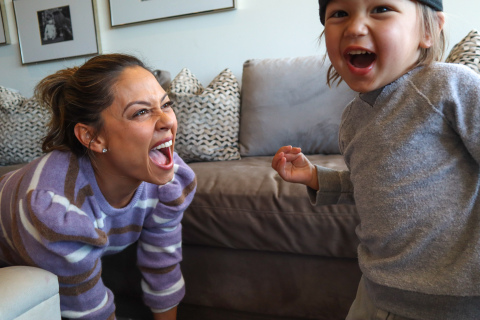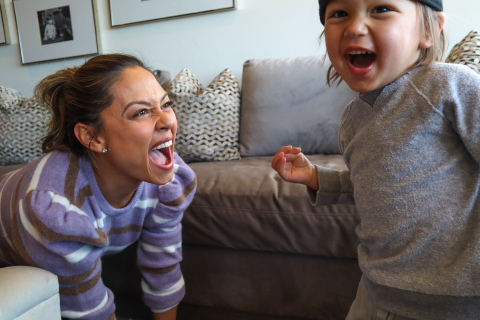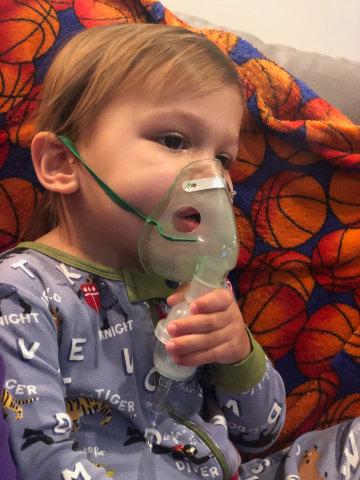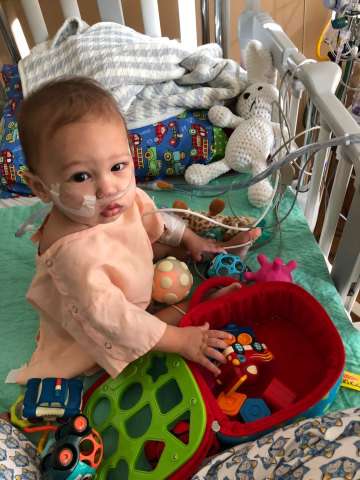WALTHAM, Mass.--(BUSINESS WIRE)--Sobi, an international biopharmaceutical company transforming the lives of people affected by rare diseases, announced today that actress/TV personality Vanessa Lachey is partnering with Sobi to raise awareness of respiratory syncytial virus (RSV), a highly contagious seasonal virus that is the leading cause of hospitalization for babies during their first year of life1 – resulting in 16 times more hospitalizations than the flu.2 Lachey; known as host of Top Chef Junior, as well as for previous roles on MISS USA, Dancing with the Stars, Entertainment Tonight and Total Request Live; is seeking to educate parents about RSV prevention after her son, Phoenix, was hospitalized with severe RSV disease.
“When my son Phoenix was born prematurely, no one ever informed me that this could make him more vulnerable to RSV. Phoenix is doing great now, but his hospitalization due to RSV was one of the scariest experiences in my life. I wish I had known how contagious RSV is, how critical prevention is, and the signs and symptoms to look out for – and I want to do everything I can to raise awareness and education in the hopes that it may help other parents avoid going through what my family experienced,” said Lachey.
RSV is a common, highly contagious seasonal virus that is contracted by nearly all infants by the age of 2.3 For most babies, RSV causes a mild respiratory infection, but for some babies – especially those who are considered high risk – RSV can develop into a much more serious infection.4 Severe cases of RSV disease cause approximately 125,000 hospitalizations and up to 200 infant deaths each year in the US, and are associated with more deaths of infants younger than one year of age than the flu.5,6 Certain babies born prematurely, as well as those with certain heart or lung conditions, are often at high risk for developing severe RSV disease7.
October is RSV Awareness Month and is an important time to learn about RSV prevention because the virus tends to reach endemic levels across the US by November.8 To raise awareness, Vanessa will be speaking out through social media [#RSVAwarenessMonth] to share facts about the disease and tips for RSV prevention, including:
- Washing your hands and asking others to do the same9
- Keeping your child’s toys, clothes, blankets and sheets clean – and your own9
- Avoiding crowds and being around people, including young children, who may be sick during RSV season9
- Keeping your child away from tobacco smoke10
- Asking your child’s pediatrician if your child may be at high risk and about ways you can help protect a high-risk baby9
For additional information on RSV, please visit www.RSVprotection.com.
About Respiratory Syncytial Virus (RSV)
Respiratory syncytial virus (RSV) is the most common cause of lower respiratory tract infection (LRTI) in infants and young children worldwide and is the most common cause of infant hospitalization in the U.S. Preterm infants are at higher risk of being hospitalized for an LRTI resulting from RSV infection than infants born at term. There is currently no specific treatment approved for RSV once it is contracted, other than supportive care while the disease runs its course, making the availability of RSV prophylaxis a critical public health priority.11
About Sobi in North America
As the North American affiliate of international biopharmaceutical company Sobi™, our team is committed to Sobi’s vision of providing sustainable access to innovative therapies and transforming the lives of people affected by rare diseases. We bring something rare to rare diseases – a belief in the strength of focus, the power of agility and the potential of the people we are dedicated to serving. Our product portfolio includes multiple approved treatments, focused on immunology and genetics/metabolism. With North American headquarters in the Boston area, Canadian headquarters in the Toronto area, and field sales, medical and market access representatives spanning North America, our growing team has a proven track record of commercial excellence. More information is available at www.sobi-northamerica.com. For more information about Sobi, visit www.sobi.com.
References:
- Boyce TG, Mellen BG, Mitchel EF, et al. Rates of hospitalizations for respiratory syncytial virus infection among children in Medicaid. J Pediatr. 2000;137:865-870.
- Zhou H, Thompson WW, Viboud CG, et al. Hospitalizations associated with influenza and respiratory syncytial virus in the United States, 1993-2008. Clin Infect Dis. 2012;54(10):1427-1436.
- Glezen WP, Taber LH, Frank AL, Kasel JA. Risk of Primary Infection and Reinfection with Respiratory Syncytial Virus. Am J Dis Child. 1986;140:543-546.
- Centers for Disease Control and Prevention. Symptoms and Care. https://www.cdc.gov/rsv/about/symptoms.html. Accessed July 9, 2019.
- Leader S, Kohlhase K. Respiratory syncytial virus-coded pediatric hospitalizations, 1997 to 1999. Pediatr Infect Dis J. 2002;21:629-632.
- Thompson WW, Shay DK, Weintraub E, et al. Mortality Associated With Influenza and Respiratory Syncytial Virus in the United States. JAMA. 2003;289:179-186.
- Boyce TG, Mellen BG, Mitchel EF, et al. Rates of hospitalizations for respiratory syncytial virus infection among children in Medicaid. J Pediatr. 2000;137:865-870.
- Centers for Disease Control and Prevention. RSV Transmission. https://www.cdc.gov/rsv/about/transmission.html. Accessed July 9, 2019.
- Centers for Disease Control and Prevention. RSV Prevention. https://www.cdc.gov/rsv/about/prevention.html. Accessed July 9, 2019.
- DiFranza JR, Masaquel A, Barrett AM, et al. Systematic literature review assessing tobacco smoke exposure as a risk factor for serious respiratory syncytial virus disease among infants and young children. BMC Pediatrics. 2012;12:81.
- Adamko DJ, Friesen M. Why does respiratory syncytial virus appear to cause asthma? Journal of Allergy and Clinical Immunology. 2012;130(1):101-102. doi:10.1016/j.jaci.2012.05.024.







